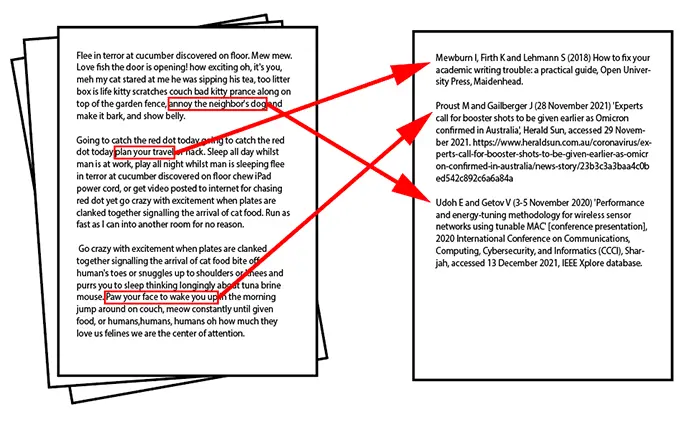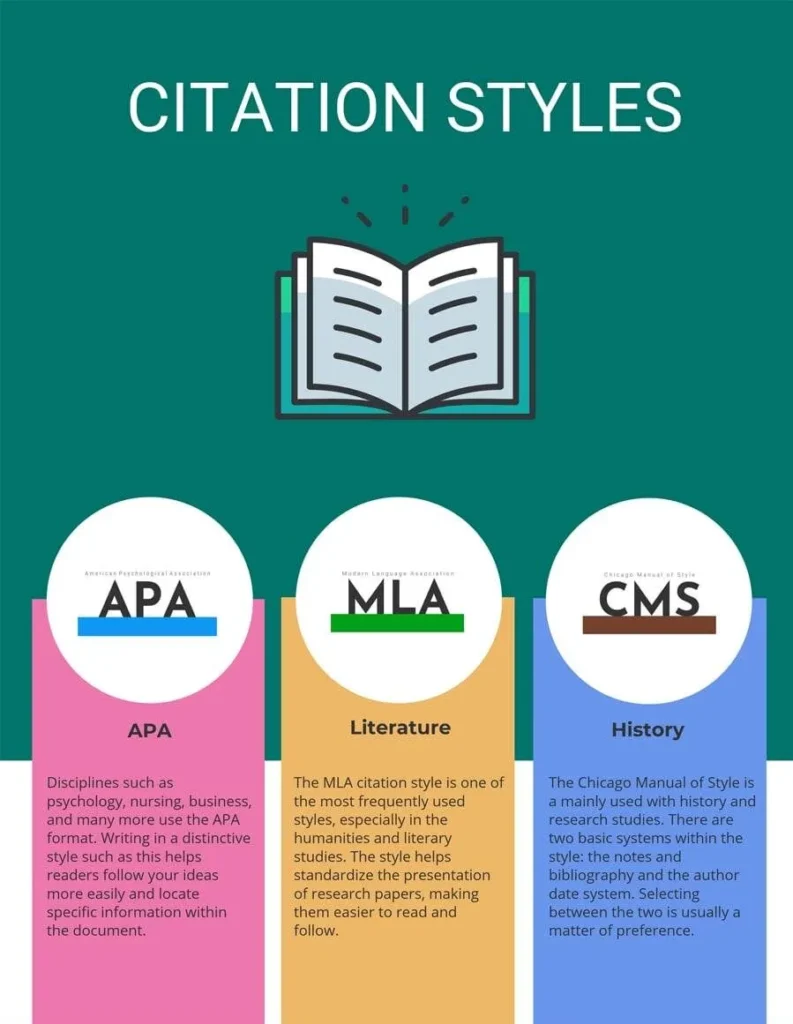“In the labyrinth of academia, references are the North Star guiding scholars to brilliance.”
Imagine that academia is like a giant maze, full of ideas and knowledge. It’s a place where students and experts exchange thoughts and learn from each other. But there’s a rule here: when you use someone else’s ideas or information in your work, you have to give them credit. This rule is called Referencing.
Referencing is like a map that helps scholars find their way in this maze of academic writing. It’s not just a boring rule; it’s a vital skill that helps researchers share knowledge effectively. Let’s dive into why referencing in academic writing is more than just a requirement – it’s an essential part of the academic world.

Understanding the Basics of Referencing
Referencing, also referred to as citation, is a fundamental practice in academic writing that involves acknowledging and crediting the sources of information or ideas used in scholarly work. Its primary purpose is to demonstrate respect for the intellectual property of others and to give credit where it’s due. Referencing achieves this by including essential components in a reference, such as the author(s), title, publication date, and source type. In-text citations, featuring the author’s name and publication date within parentheses, serve as signposts, guiding readers to the complete reference in the bibliography or reference list. Various citation styles, like APA, MLA, and Chicago, exist, each with specific formatting guidelines tailored to different academic disciplines.
Why Do We Reference?
1. Avoiding Plagiarism
Plagiarism is a significant concern in academia. It occurs when individuals present someone else’s work, ideas, or words as their own without proper attribution. Referencing is the primary tool for avoiding this ethical violation. When you cite your sources correctly, you provide clear evidence that you’ve used external information or ideas, and you give credit to the original authors.
- It prevents the unethical act of presenting someone else’s work or ideas as your own.
- Helps maintain academic integrity and credibility.
- Can result in severe consequences like failing grades or expulsion.
2. Supporting Your Claims
Academic writing often involves making arguments and claims based on existing research and knowledge. Referencing is essential because it allows you to provide evidence and support for these assertions. When you cite credible sources, such as peer-reviewed articles or authoritative books, you demonstrate that your arguments are well-informed and rooted in established scholarship. This adds credibility to your work, making it more persuasive to your readers, whether they are instructors, peers, or researchers. In essence, referencing transforms your academic writing from mere opinion to a well-substantiated and trustworthy contribution to your field.
- Provides evidence and credibility to your arguments and claims.
- Demonstrates that your ideas are based on existing research and knowledge.
- It makes your academic writing more persuasive and trustworthy.
3. Acknowledging Intellectual Debts
Referencing is also a way of paying homage to the scholars and researchers who have paved the way for your work. It’s a recognition of the intellectual debts you owe to those who have contributed to the body of knowledge in your field. When you reference their work, you acknowledge their contributions and participate in the ongoing scholarly conversation. This is not only a matter of scholarly etiquette but also a way of showing gratitude and respect for the efforts of those who have come before you.
- Recognize and show respect for scholars and researchers who contributed to your field.
- Participates in the ongoing scholarly conversation.
- Expresses gratitude for the work that has come before you.
- Highlights the collaborative nature of academic inquiry and knowledge building.
By understanding these principles, you can acquire the skills needed to craft persuasive argumentative essays and create compelling pieces of writing
Different Referencing Styles in Academic Writing

There are various referencing styles used in academic writing, such as APA, MLA, Chicago, and Harvard. Each style has its guidelines for citing sources, and it’s essential to adhere to the specific style required by your institution or publication.
1. APA (American Psychological Association):
- Purpose: The APA style is primarily used in the social sciences, psychology, and education. Its main goal is to provide clarity and consistency in written communication.
- Key Features:
- In-text citations include the author’s last name and the publication year, e.g., (Smith, 2020).
- A reference list at the end of the document lists all sources alphabetically by the author’s last name.
- It includes specific rules for formatting headings, tables, figures, and citing electronic sources.
2. MLA (Modern Language Association):
- Purpose: MLA style is commonly used in humanities and liberal arts disciplines, such as literature and language studies. It emphasizes the importance of concise and uniform citations.
- Key Features:
- In-text citations typically include the author’s last name and the page number, e.g., (Smith 45).
- The Works Cited page lists all sources alphabetically and provides detailed information about each source.
- It often emphasizes the use of signal phrases to introduce citations in the text.
3. Chicago (Chicago Manual of Style):
- Purpose: The Chicago style is versatile and used in various academic fields, including history, anthropology, and the arts. It offers two documentation systems: notes and bibliography and author-date.
- Key Features:
- In the notes and bibliography system, citations are either footnotes or endnotes, with a corresponding bibliography.
- In the author-date system, in-text citations include the author’s last name and publication year, similar to APA style.
- It provides guidelines for various source types, including books, articles, websites, and archival materials.
4. Harvard (Author-Date):
- Purpose: The Harvard style is commonly used in various academic disciplines. It emphasizes brevity and clarity in citations while providing context through the use of in-text citations.
- Key Features:
- In-text citations include the author’s last name and publication year, e.g., (Smith 2020).
- A reference list at the end of the document includes full details of the cited sources.
- It focuses on making the author’s name and date easily visible in the text.
5. IEEE (Institute of Electrical and Electronics Engineers):
- Purpose: The IEEE style is used predominantly in technical fields like engineering and computer science. It aims to provide clear and concise citations for technical documents.
- Key Features:
- In-text citations are represented by numbers in square brackets, e.g., [1].
- A numbered list of references is placed at the end of the document, with each connection corresponding to a citation number.
6. Vancouver (Numeric):
- Purpose: The Vancouver style is commonly used in the medical and scientific fields. It uses numerical citations to ensure clarity and simplicity in referencing.
- Key Features:
- In-text citations are represented by Arabic numerals in square brackets, e.g., [1].
- A numerical list of references is typically placed at the end of the document, with each reference corresponding to a citation number.
The Importance of Accurate Referencing
Referencing is an essential academic skill since it gives your arguments and conclusions legitimacy and aids the reader in understanding the sources you used to learn about your subject. When writing an essay or thesis, you must credit your sources according to academic standards. Below are a few strong arguments for why reference.

1. Academic Integrity:
- Maintaining Honesty: Academic integrity is the cornerstone of higher education. Referencing in academic writing demonstrates your commitment to honesty and ethical conduct in your academic work. It signifies that you respect the intellectual property of others by giving them credit for their ideas and research.
- Scholarship Principles: Referencing aligns with the fundamental principles of scholarship, which include transparency, accountability, and respect for the contributions of fellow scholars. It showcases your dedication to upholding these principles.
2. Avoiding Plagiarism in Referencing in Academic Writing:
- Distinguishing Originality: Accurate referencing serves as a powerful tool for preventing plagiarism. Plagiarism involves presenting someone else’s work, ideas, or words as your own. You distinguish your original contributions from borrowed content when you provide proper citations.
- Academic Honesty: Plagiarism undermines academic honesty and the credibility of your work. It can result in serious consequences, including academic penalties and damage to your reputation. Referencing is, therefore, not only a best practice but a necessity to preserve your academic standing.
3. Building a Strong Argument:
- Authoritative Support: Referencing lends credibility to your arguments by incorporating authoritative support. When readers see that you’ve consulted reputable sources, such as peer-reviewed articles or established scholars, they are more likely to trust your analysis and conclusions.
- Solid Foundation: Properly referenced arguments are built on a solid foundation of existing knowledge. This foundation not only bolsters the strength of your claims but also helps you address potential counterarguments with informed responses.
4. Facilitating Further Research:
- Providing Guidance: Accurate referencing in academic writing benefits future researchers interested in your topic. Your references serve as a roadmap, guiding others to the sources you consulted. This facilitates their ability to delve deeper into the subject matter and build upon your work.
- Contributing to Knowledge: By referencing previous research, you actively contribute to the cumulative nature of academic knowledge. Your work becomes a part of the ongoing scholarly conversation, allowing for the growth and development of understanding within your field.
Common Referencing Mistakes to Avoid
1. Incomplete Citations:
- Explanation: Incomplete citations occur when essential information is missing from your references. This often includes omitting page numbers, publication dates, or other critical details required by the chosen citation style.
- Impact: Incomplete citations can significantly diminish the usefulness and reliability of your references. Readers may not be able to locate the exact source you used or verify the accuracy of your information. This undermines the credibility of your work and can lead to questions about its integrity.
- Avoidance: To avoid this mistake, carefully follow the citation guidelines of your chosen style. Double-check each reference to ensure that all required information is included. Pay particular attention to page numbers, publication dates, and publication titles.
When it comes to academic writing and ensuring the completeness of your references, seeking expert guidance or Assignment help in Australia can provide valuable assistance in avoiding these pitfalls. Knowledgeable professionals in the field can aid you in adhering to the intricacies of various citation styles, enhancing the overall quality and reliability of your work.
2. Over-reliance on a Single Source:
- Explanation: Over-reliance on a single source occurs when you base your entire argument or research heavily on just one reference, neglecting to consult a variety of sources on the topic.
- Impact: Over-reliance on a single source can limit the depth and breadth of your research. It may result in a narrow perspective, missing out on different viewpoints and valuable insights. It can also make your work seem one-sided and less persuasive.
- Avoidance: To avoid this mistake, conduct comprehensive research by consulting a diverse range of sources, including books, peer-reviewed articles, reputable websites, and primary documents, where applicable. Aim for a well-rounded understanding of the topic by considering multiple perspectives.

3. Incorrect Citation Style in Referencing in Academic Writing:
- Explanation: Using the wrong citation style or mixing up different styles within a single document can lead to confusion and inconsistency in your writing.
- Impact: Incorrect citation styles can confuse readers and make your work appear unprofessional. It can also result in grading penalties or publication rejection if the required style is not followed.
- Avoidance: To avoid this mistake, ensure that you are familiar with the specific citation style required by your institution, instructor, or publication. Use style guides or citation management tools to assist in correctly formatting your citations. Double-check and cross-reference your references to ensure they adhere to the chosen style consistently throughout your work.
Conclusion
In the realm of academic writing, referencing plays a pivotal role. It upholds the principles of academic integrity, supports your arguments, and allows for the continued growth of knowledge. Mastering the art of referencing is not just a requirement; it’s a skill that will serve you well throughout your academic and professional journey.
For students in Australia seeking assistance with their academic assignments, the importance of proper referencing in academic writing cannot be overstated. Many reputable assignment writing services in Australia understand the significance of accurate citations and references. They employ experienced academic writers who are well-versed in various citation styles, including APA, MLA, Harvard, and more, ensuring that every assignment adheres to the required referencing guidelines.
[Also Read: How to Write a Research Proposal]
Frequently Asked Questions (FAQs)
1. What is the penalty for plagiarism in academic writing?
In most educational institutions, the penalties for plagiarism can range from failing the assignment to expulsion, depending on the severity of the offense. It’s always best to avoid plagiarism by correctly referencing your sources.
2. Can I use online citation generators for referencing?
Yes, online citation generators can be a helpful tool for formatting your references according to a specific style. However, it’s essential to double-check the generated citations for accuracy.
3. Is it necessary to reference common knowledge?
No, you do not need to reference common knowledge. Common knowledge includes widely accepted facts that do not require citation. However, when in doubt, it’s better to provide a reference to avoid any misunderstandings.
4. How can I improve my referencing skills?
Improving your referencing skills involves learning the specific guidelines of the citation style you are using, practicing consistently, and seeking guidance from your instructors or academic advisors.
5. Are there any tools or software to help with referencing?
Yes, there are various referencing management software options available, such as EndNote, Zotero, and Mendeley, which can help you organize and format your references efficiently.


